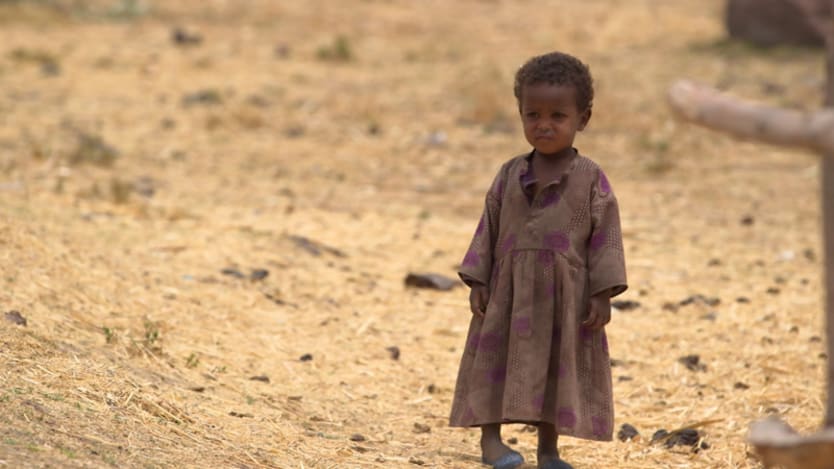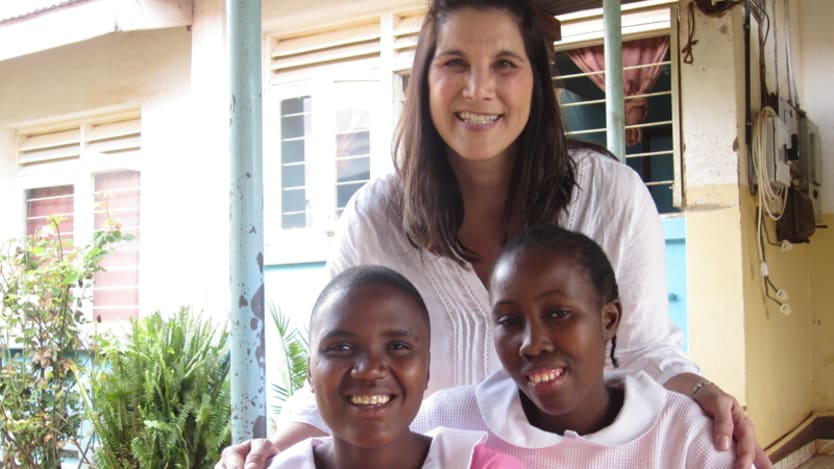
Instability, conflict and harsh living conditions can mean those living in fragile states are more vulnerable to disease and illness, making access to basic health services an urgent necessity. However, the complex nature of these contexts often requires different approaches in health care delivery. While many traditional aid organizations work to provide that crucial care, the private sector can sometimes be better placed to do so.
“The private sector has an ability to deliver services generally very quickly and sometimes at a higher standard than the public sector, particularly in a time of crisis,” said Joy Marini, global director, Insights, Johnson & Johnson Global Community Impact. Speaking to Devex, Marini detailed what the private sector can bring to fragile settings. She shared the ways in which companies such as Johnson & Johnson are taking on new challenges and how the sector enjoys approaching problems in new and creative ways.
Marini also explained why, when it comes to the delivery of health care services within these contexts, organizations need to look through a different lens and recognize the potential of those living within humanitarian contexts.
Below are more highlights from the conversation, edited for length and clarity.
What contribution can the private sector make when it comes to tackling global challenges?
The obvious answer for most people is funding, but the private sector has a wealth of resources it can bring to the table. Even funding doesn't have to be philanthropic or grant funding; it can include other types of funding such as social impact bonds or innovation bonds. Johnson & Johnson has more than 127,000 employees with incredible skills — employee volunteerism is another way that the private sector can contribute. Then there’s business strategy, strategic frameworks, rigor in monitoring and evaluation, and expertise in communications and advocacy.
Other things include open innovation networks and the convening power the private sector has. If you combine that with the convening power of governments, nonprofits and multinationals, there’s an incredible network of global and local relationships. If you map that, it’s unbelievable how far reaching and powerful those collaborations can be.
How do conflict and displacement affect health and how are companies such as Johnson & Johnson able to improve conditions?
There are fragile and conflict-affected states, humanitarian crises, or situations where refugees originate or transporters settle. What’s similar in all of these contexts is that, as health systems collapse, we see maternal and newborn health indicators worsen. These are often the marker or the mirror for how the whole health system is functioning.
We know that in these contexts, women and children are adversely and disproportionately affected. For example, in South Sudan, an area where there has been conflict for decades, adolescent girls are more likely to die in childbirth than they are to finish primary school. The other thing we have to consider is the gender impact in conflict and displacement, including rape and sexual violence. This is not exclusive to states of conflict and displacement, but is often amplified in these situations.
Beyond maternal and newborn systems, we also know that when the health system is disrupted we, the global community, have an inability to address communicable and noncommunicable diseases. There is an entire cycle of problems across the board.
“If we expect to engage in humanitarian crises, fragile states, those with refugees, any of those contexts, we cannot use the same lens as the one used in a stable environment.”
— Joy Marini, global director, Insights, Johnson & Johnson Global Community ImpactOne of the examples of positive private sector impact, however, happened during the recent Ebola outbreak. Johnson & Johnson has an important responsibility to address urgent, unmet medical needs and so when the outbreak happened, we’d already been working on an Ebola vaccine. But in 2014, it became an “all hands on deck” situation where the total focus of our vaccine experts became figuring out how to provide long-term protection against the virus. We are committed to continuing the development of our Ebola vaccine and have vaccine developed in the event of another crisis.
We also recognized that the health systems were in crisis, so we made a commitment to help strengthen the capacity of those systems. That meant looking at both numbers and quality of the health workforce, trying to ensure they have the local support they need, the supplies, the manpower, etc. We are working with the government of Sierra Leone, UNICEF and the Liverpool School of Tropical Medicine to strengthen the health system, especially for women and children. We plan to be engaged in health systems support for the next few years.
What are some of the main obstacles to engagement?
In the private sector, there’s a belief that sustainability or scalability can’t be achieved when working in a fragile or humanitarian context. For the private sector, that’s a huge barrier because “investment” in development starts to look like charitable giving.
There are also barriers in not having familiarity with the local government, local policy, local infrastructure and cultural differences, and for the private sector, this involvement is also an investment. Even if it’s an investment in social impact, the sector wants to know what’s been achieved. There's this perception that it’s impossible to have any success in impact measures. But it is possible to measure, with appropriate evaluation plans and longer timelines in place.
Then there’s a concern about the capacity it takes to work in these contexts, that it takes an inordinate effort, and there’s an imbalance between the time and the resources necessary to achieve your goals, as opposed to working in less complex situations.

What lessons has Johnson & Johnson learned from providing health care solutions in fragile states and in overcoming these obstacles?
One of the things that we’re emphasizing is alignment with local priorities. Rather than there being a top-down approach, we have regional teams that look more at the ground up because these situations are so complex and so unique. We’re tailoring how we do our work so we must innovate and create strategies that work in high-risk and low-capacity settings.
We’re viewing evaluation in a different way. We have to be creative about how we collect information, what information we're collecting, and in adjusting the timelines. Sometimes the private sector has an expectation of very quick turnarounds and in these contexts, longer timelines increase the possibility for success for both on-the-ground results and complete evaluations.
Johnson & Johnson is also partnering with local organizations and considering networks and allies, because the stronger our network of partners is, the better the opportunities in terms of sustainability.
Finally, we must look at everything through a different lens. If we expect to engage in humanitarian crises, fragile states, those with refugees, any of those contexts, we cannot use the same lens as the one used in a stable environment. We really have to redefine what success is in those cases.
Ahead of Global Development Week and the U.N. General Assembly in New York, what’s your key message for the global development and health communities, as well as the private sector?
I was having dinner one evening with a friend of mine from Liberia and we were talking about fragile states, and the first thing that he said was “I wish we could come up with another word for fragile states, because that's not how we see ourselves.”
It was like lightning had hit me. I suddenly realized that this was one of the big shifts that we needed to make. Here’s the learning: for those working in social impact, including the private sector, we need to recognize the more than 1.6 billion people living in humanitarian contexts as a potential opportunity to create a better world, because that's how they view themselves. We can be successful in working together in terms of improving not only the health and the potential of those individuals, but of those communities and those countries. It’s not impossible.
To learn more about Johnson & Johnson’s Commitment to accelerating progress toward the SDGs, click here, or join Devex and the Johnson & Johnson Global Community Impact for a #GlobalGoals Twitter Chat ahead of the United Nations General Assembly on Wednesday Sept. 13 10am ET / 4pm CEST.








